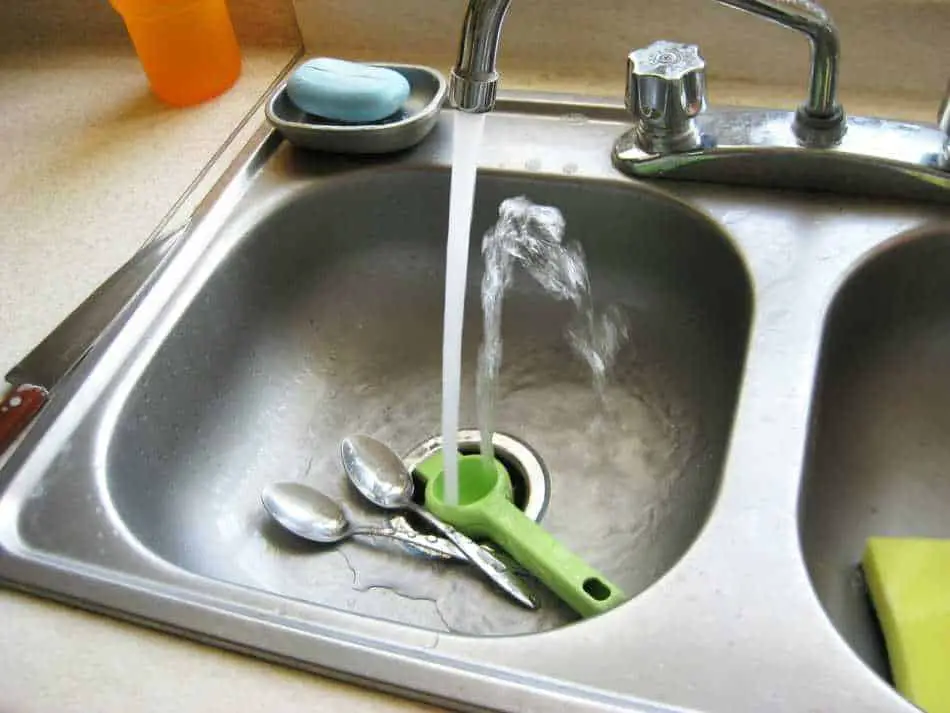Many individuals are unsure if they should wash the dishes in cold or hot water. You may discover a variety of viewpoints on the internet, but we’ll assist you to discover the correct answer based on the experts’ findings.
Can you wash dishes in cold water? You can wash dishes in cold water. If you use dish soap, scrub, and rinse the dishes well along with a small amount of ammonia added, you will be able to remove harmful germs and bacteria to an acceptable level.
Pascali and Lee, researchers at Ohio State University concluded that you could remove the harmful bacteria on dishes by using cooler water. Hot water is not necessary.
It is feasible to clean your plates in colder water, however, you’ll need to scrub harder or for a longer time to obtain them as clean as usual.
There are several advantages to hand washing your dishes in hot water. Hot water removes grease from your plates, which cold soapy water cannot do unless you apply some force. Read more to know the difference between washing the dishes in cold water and hot water.
Can you wash dishes in a dishwasher with cold water
You may wash dishes while connected to cold water since most dishwashers use an element that will heat the water for you. For germs to be killed during the sanitize phase, the National Sanitation Foundation recommends a temperature of one hundred- and fifty-degree Fahrenheit.
Some dishwashers are designed to heat the water during the sanitary phase to more than 170 degrees such as models of Whirlpool. Nevertheless, it is recommended that you connect your dishwasher to the hot water outlet so that the heating process will be as long. You should even turn on the hot water for your kitchen sink to order to start to use hotter water that is from your hot water tank. This will save on electricity. I recommend checking out the Farberware dishwasher on Amazon by clicking here.
Is washing up with cold water bad?
You can wash up dishes with cold water. However, washing up with cold water is bad in several cases.
Many solutes are not soluble in cold water, which makes dissolving them more difficult. It’s much easier to dissolve substances in hot water. In cold water, the same chemicals do not dissolve and settle at the bottom.
Detergents and soaps dissolve more readily in hot water than they do in cold water. The soap becomes hard when cooled, making it difficult to remove even with warm water. Molecules are moving faster in hot water, allowing bonds to form and break much easier.
As a result, hot water dissolves detergents more quickly and readily than cold water.
According to Dr. Milner, a biomedical scientist from Anglia Ruskin University, it’s all about the scrubbing action. The temperature of the water does not appear to make a significant difference in the studies. Hence, a good scrub is more essential than the water temperature.
When it comes to cleaning, cold water does not compare favorably to hot. Water’s ability to combine with dirt particles is what makes it possible for anything to be cleaned. In addition, detergent aids in the formation of a bond between the particles, allowing them to be washed away with the water.
Because most detergents are surfactant-based, they aren’t designed for cold water. They require heat to effectively clean grease and stains.
In cold water, the water molecules are less active than they are in hot water. In hot water, the molecules of water move swiftly, which causes them to form and break connections faster.
This is because water molecules do not link as strongly with dirt particles at low temperatures as they do at high temperatures. This enables us to wash dishes efficiently using hot water rather than cold water.
Here is a video discussing the use of cold water to wash dishes:
Does washing dishes in cold water kill germs
You may wash the dishes in cold water, but it doesn’t destroy germs and bacteria. Coldwater can slow down the replication of many germs and bacteria by turning them into inactive states. However, to kill the majority of bacteria and germs that accumulate in every home, hot water is required.
Rinsing with hot water at the end of the process will not only remove any remaining soap (if any was used), but it will also kill almost 99% of germs and bacteria from your dishes.
However, if the correct detergent is used, cold water can remove bacteria and germs as effectively as 100 degrees hot water, according to research. Detergent is essential for cleaning and washing objects. However, since many detergents are surfactants based, they function best in hot water rather than cold.
According to Amanda Carrico, RA professor at VIEE, heat kills bacteria, but the level of heat required to eliminate microorganisms is greater than what is considered safe for prolonged human contact.
Cleaning plates and glasses in water at room temperatures is just as effective. Simply wash them in soapy water, rinse, then add a bit of dish soap—the equivalent of restaurant-style ammonia solutions but not widely used in homes. I recommend checking out Dawn Ultra dishwashing liquid on Amazon by clicking here.
It is more convenient for you and your hands to wash dishes in cold or lukewarm water, however, they aren’t very helpful in the cleaning process since germs can’t be destroyed by cold water.
Washing dishes in hot water does kill germs; however, the temperature should be above 65°C for a thorough and effective clean. These are not temperatures that your hands can withstand, therefore there’s no assurance that you’ll get rid of germs on your plates by handwashing alone.
Hot water can be harmful to your hands if it’s too hot, with a temperature of over 60°C/140°F. Dishwashing temperatures, on the other hand, are capable of reaching much higher degrees.
Table tallying what percentage of people wash their dishes in hot water versus cold water:
| Dishes Washed in Hot Water | Percentage of Total Responses |
|---|---|
| They always wash their dishes in hot water | 87% |
| They prefer to wash their dishes in cold water only | 13% |
Should you rinse dishes in hot or cold water
Instead of running the dishwasher, rinse dishes in hot water because hot water has a greater cleaning capacity. Hot water also cuts down on the amount of dish soap needed and speeds up dishwashing.
Bacteria and germs accumulate on unclean plates, and hot water is the most effective method to destroy them. A dishpan should be used to rinse the dishes if there isn’t a second sink. If the temperature of the dishwashing water is less than 90 degrees Fahrenheit, dirty dishes may develop a greasy film that does not adequately clean them.
It’s a good idea to wear rubber gloves when washing and rinsing dishes in extremely hot water to safeguard your hands. To avoid acquiring new germs, sponges, scrubbers, and scrapers should never be left in the sink. To keep bacteria at bay, dishcloths should be washed.
Water heated to a high temperature dries much more slowly on china and flatware, resulting in hand-washing. When dishcloths are wet, they become infested with even more germs, contaminating the dishes once again.
Hot water allows the dishes to dry naturally without leaving spots or streaks on them. A dish rack prevents the surplus water from soaking into the dried plates, leaving no marks or streaks behind.
Hot water dries dishes considerably faster than warm or cold water. If the temperature of the water during the rinse is hot, dishes dry themselves in a manner. Hot water also keeps plates clear and streak-free.
Dishwashing should be done in cold water, but to reduce the bacteria level, you should rinse them with water that is hot afterward. Hot water is far more successful at removing grease and stains than cold water except for the proteins.
Porridge pans can be simply cleaned in cold water, which is much more convenient and easier than rinsing them with hot water, which will make it difficult and they will adhere to the plates.
Can washing dishes in cold water make you sick
You can easily utilize cold water in an emergency since you cannot wait for the water to warm up. When it is possible, however, sanitize those utensils with hot water after use.
Hot water is more effective than cold water when it comes to protein removal, although you may not be aware that cold water can achieve the same results as hot.
It’s clear that if you wash all of your dishes with chilly water, your hands will be cold. Getting hands harder is not only unpleasant but also highly inconvenient during the harsh winter months than in the warm water.
Expose the frozen extremities directly to cold water, and you risk causing bruising or extra swelling. A painful sensation is also possible when your hands are exposed to extreme cold for an extended period. Furthermore, if your hands are exposed to severe cold for a lengthy amount of time, they may become frostbitten.
According to a study published in the Journal of Food Protection, individuals who used lotion on their hands had fewer bacteria after washing than those that didn’t, possibly because moisturizing might assist heal dry and damaged skin that is more challenging to clean.
To effectively destroy germs on dishes, you’ll need hot water. It may appear as though you can squeeze a little more usefulness from a dishpan full of chilly water, but risking your family’s exposure to germs is not worth the extra effort of starting over with a new pan of boiling water.
As the water gets colder, it reduces the amount of energy available to your hands. This makes washing dishes in cold water uncomfortable and difficult because you won’t be able to wash them as freely as you would if they were slightly warm.
Washing dishes with cold water will certainly be unpleasant for your hands since it prevents blood flow from being smooth. So many people, especially, for this reason, continue to use hot water.
Washing dishes with hot water bad for hands
People believe that the hotter the water we wash our dishes in, the more effective it is at eliminating germs. This is not necessarily true, and in fact, hot water may harm our hands.
When we expose our hands to hot water, we do more harm than good. The intense heat of the water causes the protective layer of skin on our hands to deteriorate, which leads to an increase in skin discomfort such as redness, dryness, pain, and itching.
When the protective layers are damaged, it makes a person more vulnerable to germs on their hands.
It has been observed that people wash their hands roughly 64% of the time with warm or hot water.
According to Barry Michaels, a food safety expert, warm water has been shown to irritate the skin, especially when people are exposed to higher temperatures.
It may also harm the protective barrier that surrounds the skin (the skin has numerous tissue layers and cells that help to protect it from damage), which would result in less resistant skin to bacteria.
In the previously mentioned research paper, there is also evidence suggesting that any exposure to 55°C (131°F) for up to 30 seconds causes second-degree burns.
In case you are irritated by hot water, you can keep in mind the following tips:
After cleaning the utensils, apply a thick layer of moisturizer, ideally one that includes shea butter, because it may be very hydrating.
It’s suggested that you apply a thick layer of lotion and use gloves at night if you wash the dishes every day. Choose a pair with breathable fabric so that your hands do not become sweaty. In the long run, this is quite effective.

